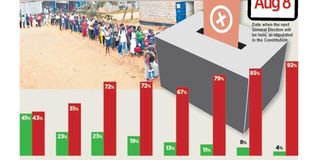‘Undecided’ voters could tilt the scales in polls

Voters queue during past polls. The latest survey report released by Ipsos shows that eight per cent of voters are undecided and two per cent have not declared their intentions. PHOTO | FILE
What you need to know:
- The latest survey report released by Ipsos on Tuesday shows that eight per cent of voters are undecided and two per cent have not declared their intentions.
- The survey, which was commissioned by Ipsos, was conducted between May 11 and 23 in 46 counties with 2,026 completed interviews and 5,484 contacts.
The candidate who manages to win over the Kenyans who are not decided on whom they will vote for as president and those who have not said if they will vote at all will have a definite advantage in the August 8 General Election.
The latest survey report released by Ipsos on Tuesday shows that eight per cent of voters are undecided and two per cent have not declared their intentions.
Mr Tom Wolf, the Ipsos lead researcher, said they used the 2009 population census figures to tabulate the data but were waiting for the Independent Electoral and Boundaries Commission (IEBC) to complete verifying the voters register so that they could have an updated list.
REGISTERED VOTERS
However, going by available data, the country has 19,462,360 registered voters.
Divide this by the 10 per cent who are yet to take sides and you get 1,946,236 votes, which can guarantee victory for whoever gets most of them.
In the context of support for political parties, the Jubilee Party has four per cent who are undecided, and five per cent for Nasa.
“Presumably, these are the voters to be targeted by campaign activity, apparently already under way,” said Mr Wolf.
The survey, which was commissioned by Ipsos, was conducted between May 11 and 23 in 46 counties with 2,026 completed interviews and 5,484 contacts.
MARGIN ERROR
The study had a margin error of plus-or-minus 2.18 and a 95 per cent confidence level.
It showed that the Opposition has gained ground on the incumbent — with support for Mr Raila Odinga up from 30 per cent in January, before the Nasa team was fully constituted, to 42 per cent the Odinga-Kalonzo Musyoka ticket.
The entry of Mr Musalia Mudavadi into Nasa, boosted by numbers perceived to be controlled by co-principals Musyoka, Moses Wetang’ula and Isaac Ruto, may have contributed to the improved rating for the Opposition coalition.
RISE IN RANKING
According to the Ipsos January survey the rise of opposition ranking could be attributed to the absorption of Mr Mudavadi and Mr Musyoka’s votes who together received 9 per cent of the “vote”.
The latest poll also revealed that 94 percent of respondents claim to be registered voters, a figure Mr Wolf said they would not satisfactorily prove, but of these paint a picture of Kenyans who are willing to practise their democratic right.





